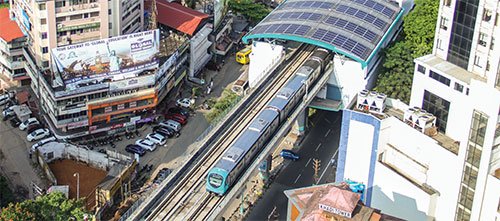An advanced Metro system will always give a revitalising facelift to the city. The same will revolutionise the lifestyle of the residents. A Metro should be developed in such a way that it should bring the city up to the global levels and create a unique service that has a lot of innovations. And, that’s what Kochi Metro Rail (KMRL) precisely doing since inception
Beyond just transporting people, Kochi Metro opens up a new avenue of life that incorporates people, nature and sustainable development. With several firsts and innovations to its credit, Kochi Metro presents an advanced experience in integrated transportation to every commuter.
Kochi Water Metro
 Inland water transport is inherently more energy efficient than rail or road transport. However, once the primary means of freight and passenger transport, the system has been declining over the last few decades and has seen minimal investment and technology upgrade. However, Kochi Metro Rail has envisaged a water transport project which is expected to reduce pollution and traffic congestions in the city and also easy access to business areas on the mainland for urban households situated along the Kochi lakeshore.
Inland water transport is inherently more energy efficient than rail or road transport. However, once the primary means of freight and passenger transport, the system has been declining over the last few decades and has seen minimal investment and technology upgrade. However, Kochi Metro Rail has envisaged a water transport project which is expected to reduce pollution and traffic congestions in the city and also easy access to business areas on the mainland for urban households situated along the Kochi lakeshore.
“The Kochi water metro project will develop15 identified routes, connect 10 islands spanning over 78 km route and a fleet of 78 fast, electrically propelled hybrid ferries plying to 38 jetties,” says Alkesh Kumar Sharma, the newly appointed Managing Director of Kochi Metro Rail Limited.
More than 100,000 islanders are expected to benefit from the water metro. It is envisaged to be a socially inclusive transport system than being just a transport service with a focus on improved livelihoods through commercial property development and tourism-based initiatives. The project intends to introduce modern, energy-efficient, environment-friendly and safe boats with low wake and draft characteristics at a high frequency to increase ridership.
The project will cost Rs 747.28Cr with core water transport infrastructure estimated at Rs 435.37Cr. German Funding Agency KfW will fund the project to the tune of Rs 579Cr. The balance Rs 102Cr is being funded by the Government of Kerala.
In order to encourage private sector participation in the project and reduce burden on the government, private sector participants under suitable business model was proposed. The funding to be provided by the private sector is estimated at Rs 66Cr. Thus the total capital outflow excluding private participation is expected to be Rs 681Cr. Sharma avers, “Kochi is the first city in the country that has achieved such a milestone whereby water transport has been integrated as a feeder service to the metro. It is also for the first time in India that such a significant level of investment is being brought in for improving water transport.”
 TrafficInfraTech Magazine Linking People Places & Progress
TrafficInfraTech Magazine Linking People Places & Progress